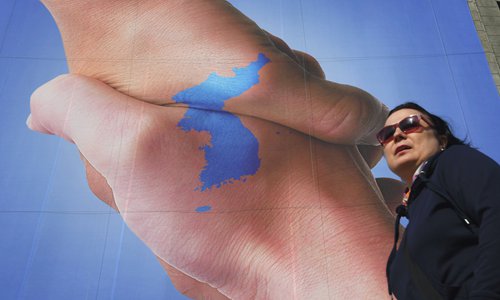
A woman walks past a banner showing two hands shaking to form the shape of the Korean Peninsula in 2018. Photo: AFP
The Korean Peninsula situation is unlikely to become intense, said Chinese analysts, despite military exercises between the US and South Korea on Monday, North Korea's launch of a "new tactical guided weapon" on Sunday, and a massive military parade next week.
The US-South Korea drills this time have no "field maneuvers," according to South Korea's Joint Chiefs of Staff (JCS), which said in a statement that South Korea-US computer-simulated exercises will run for nine days starting Monday in comprehensive consideration of the combined defense readiness.
Lü Chao, an expert on Korean Peninsula issues at the Liaoning Academy of Social Sciences, told the Global Times that the computer-simulated exercises are much less provocative than the drills participated by US aircraft carriers, and it won't cause a tough retaliation from Pyongyang, since the weapon launched by North Korea on Sunday was neither a ballistic missile nor a nuclear test. "At least at this stage, both sides are just doing what they must to show political attitudes, with no intention of causing new tensions."
North Korean official media KCNA reported that the weapon launched on Sunday has "great significance in drastically improving the firepower of the frontline long-range artillery units and enhancing the efficiency in the operation of tactical nukes of the DPRK and diversification of their firepower missions."
Military analysts said the test is tactical but also related to nuclear weapons as it can carry tactical nuclear warheads. Pyongyang's action is a crucial sign that North Korea could be capable of using nukes for tactical purposes in conventional wars. Although Seoul didn't respond tough at once, it will engage with the US on how to deal with this new development.
US special representative for North Korea Kim Sung arrived in Seoul on Monday for talks with South Korean officials on North Korea's recent launches and "the possibility of additional provocations," Yonhap News reported.
Kim Sung is also expected to meet officials from President-elect Yoon Suk-yeol's transition team to coordinate North Korean policy, the report said.
Lü said some observers believe the US is now prioritizing the Russia-Ukraine crisis and has no time to handle the Peninsula issue. But Kim Sung's visit shows that Washington still cares about the issue. "Yoon was being hostile toward the North, so the US also needs to figure out how the new South Korean government would likely deal with the North."
As long as the US and South Korea don't raise military provocations, Pyongyang would not actively launch actions to increase tensions, Lü said, noting that "if Pyongyang is provoked, the retaliations would include nuclear tests or more direct military actions."
The dialogue between North Korea and the US has reached an impasse as the US refused to reduce sanctions unless North Korea gives up all nukes first. Lü said "Pyongyang would not make any further compromise, and if the Biden administration wants to break the deadlock and to have meaningful diplomatic legacy, it's time for the US to consider adjusting its policy."
South Korean media KBS reported that North Korea is moving forward with preparations for a military parade next week to mark the 90th anniversary of the founding of the Korean People's Revolutionary Army.
Seoul projects that at the parade, Pyongyang could unveil an intercontinental ballistic missile (ICBM) capable of carrying multiple nuclear warheads, a submarine-launched ballistic missile (SLBM), and short- and mid-range ballistic missiles capable of carrying small nuclear warheads, KBS reported.
Experts said that North Korea's nuclear arms are getting increasingly mature in recent years, and the later Washington restarts engagement with Pyongyang to ease sanctions, the less the US could get from the negotiations on denuclearization.




